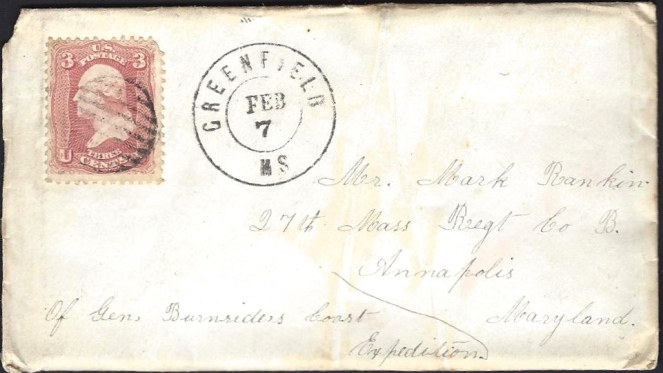
Greenfield, [Massachusetts]
February 4, 1862
Dear Mark,
I seat myself with pleasure this beautiful evening to pen you a few lines to let you know that I have received your letter. It came to my hand last Friday evening. I thought that I should never get another letter from you. I looked for one every day until I got tired. I suppose that you did not have any opportunity to write.
I was very glad to hear from you once more, although I was very sorry to hear that you had had such a hard time. The papers state that you had an awful time while on water. Don’t you wish you had stayed at home with me. If you do not, I do — or with Eliza J. [Thayer], I should of said. I was very much pleased to hear that you had received my letter. I did not expect you had or ever would. I think every time I write that perhaps you will never see it. I will answer your letters as soon as I receive them so if you do not receive them you need not think I have not written.
I wish I could write something that you would like to hear. As for Erving, I know no more about it than you do for I have not heard a word from there since I was there. I have been expecting a letter from Eliza J., but I suppose she has to write to you so often that she does not have time to write to me.
Mr. Felton called to see me this evening and stayed all evening. Now I guess you feel as bad as I did about Eliza J. writing to you. Come, can’t you tell me what Eliza J. wrote? Did she write anything about that long talk you had with her before you went to Springfield? I can guess what she wrote. I wish you had waited and gone with James Osgood. ¹ Then you would have been here now. And perhaps you never would have gone. I think of you all the time since I hear the 27th Regiment had gone with the Burnside Expedition. I never have anything good to eat without I think of you. As for a sleigh ride this winter, I do not expect I shall get one.
I have thought [a] good many times that I should like such a one as that I had last winter. Do you remember the Sunday that we were going onto the mountain and had to back out? I often times think of the good times that we had.
Capt. E. E. Day ² has been home here and [is] taking his wife back to Washington with him. He said that the Erving Boys were all well. Albert Field ³ is the best man he has in the company. I wish you had gone with them and then you would not [have] suffered as you have now. I expect to hear every day that you have had an awful fight. It makes me tremble to think of it and I guess it does you.
I cannot think of much tonight as I have not any news to write. I hope next time that I write I shall have some good news to write. I am not very well tonight and I have not been for two weeks. I hope you will excuse all mistakes for I have not known half the time what I was writing about. I hope you will write often. Do not wait for my letters.
I will close by wishing you a kind goodnight and hoping I shall hear from you soon and that you are where you will not suffer anymore for the want of anything that Earth can give.
Please accept these few lines from your ever true friend, — Alma
¹ James S. Osgood enlisted at age 24 on 1 November 1862 in Co. K, 47th Massachusetts Infantry. He was mustered out of the service at New Orleans on 1 April 1863 after six months service.
² Edwin E. Day was a 35 year-old stone mason from Greenfield, Massachusetts, when he was commissioned captain of Co. G, 10th Massachusetts Infantry. He was killed on 21 June 1862 at the Battle of Fair Oaks. His body was buried on the field but 3½ years later it was exhumed and brought to Greenfield to be reburied in the Green River Cemetery.
³ Albert A. Field was a 21 year-old mechanic when he enlisted at Erving, Massachusetts, in Co. G, 10th Massachusetts Infantry, in May 1862. He made corporal in June 1864. He later served in Co. M, 3rd Massachusetts Cavalry.


